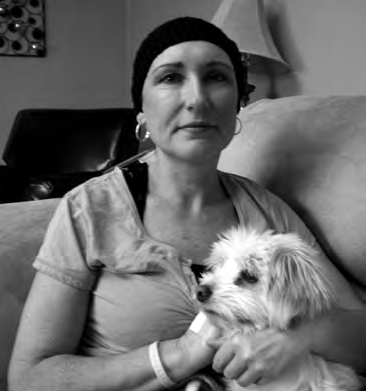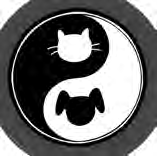Read 100 Perks of Having Cancer: Plus 100 Health Tips for Surviving It Online
Authors: Florence Strang
Tags: #Health; Fitness & Dieting, #Diseases & Physical Ailments, #Internal Medicine, #Oncology, #Cancer, #Medicine & Health Sciences, #Clinical, #Medical Books, #Alternative Medicine, #Medicine
100 Perks of Having Cancer: Plus 100 Health Tips for Surviving It (33 page)




Perk #32
Cancer Made Me
Appreciate My Pooch
M
y dog-loving friends would be morti-
fied to hear that during cancer treat-
ment I actually fantasized about killing my
dog, Patches. One night, for example, she
woke me from a sound sleep with a shrill
whine and the clickity-clack of her sharp
nails tap dancing across my laminate floor.
I faked I was asleep for as long as possible,
but soon realized I was not going to get any
rest until I let her out to pee. At this point
in my story I would like to send a sincere
apology to my neighbors, in case they
looked out at 2 AM that night and saw a
bald woman, clad only in her underwear
(thanks to my hot flashes), yelling, “Hurry
Flo and Patches
up and pee, would ya!”
But I digress. Patches proved herself to be a faithful and loving compan-
ion throughout my cancer treatments. She never left my side. As I was
fading in and out of consciousness postchemo, I could always count
on seeing her furry face, black lips, and big brown eyes looking at me
when I opened my eyes. She had been with me for nearly ten years,
but that was the first time that I truly enjoyed her company. Too bad
it took getting cancer to make me really appreciate having her around.
If you are battling cancer, this might not be the best time to get a new pet.
But if you already have one, cherish the relationship with your furry friend.
I 130 J

Perk #32: Cancer Made Me Appreciate My Pooch
131
HEALTH TIP #32
Pooch, Pussycat, or Python, They All Have Health Benefits
O
kay, the python is a bit of a stretch, but I’m sure there are those who love
their pet python as much as Flo loved Patches. And why shouldn’t they?
Pets offer us a never-ending supply of unconditional love, and that love has a
positive effect on stress, which in turn has a positive effect on your health.
Among dozens of studies on pets and health are those that find:
●
Pet owners have a lower risk of dying of heart disease than non–pet owners.
●
Fifteen minutes with a pet (dog, cat, or watching fish—not sure if snake
handling was included in the study) actually caused chemical changes in
the body that improved moods and reduced stress.
●
People who own dogs are more physically fit than non–dog owners
because of the regular walks dogs require, and this can be of particular
benefit to those recovering from surgery or a severe illness.
●
Pet owners were found to have lower blood pressures than non–pet owners.
●
Those who grow up with pets have stronger immune responses and are
actually less likely to develop allergies as they grow older.
●
People who have undergone major surgeries recovered faster if they had
a pet at home.
So if you have a pet, whether furry, feathered, or scaly, taking
Embrace your pet
a dose of companionship and love along with your antinausea
to let go of stress.
meds might just be just what you need to get through those tough
days. There are some precautions, however, for pet owners under-
going treatment for cancer or who have a compromised immune system.
●
Litter boxes and cages should be kept out of the kitchen.
●
Wash your hands thoroughly with plain soap and water after handling
your pet.
●
Get someone else to clean cages and litter boxes and pick up poop. (Hey
Flo, I think I just found another perk!)



Perk #33
Playing the
Ole Cancer Card
I
dunno, there is just something about having cancer that makes you think
that you no longer have to play by the rules. For example, if my sixteen-
year-old daughter, Kaitlyn, were to say, “Mom, you can’t park here, it’s a no
parking zone!” I’d say, “But of course I can, honey, I have cancer.” It is as
if cancer had given me a newfound sense of entitlement. Besides, who was
going to make me move my car if I happened to slip and say that I have
cancer? Although my teen chastised me for this attitude, I found her on
occasion playing the ole cancer card as well: “Sorry my essay is late, Mrs.
Smith. Yesterday was Mom’s chemo day.”
Hopefully there will only be a short time in your life when
you get to play the cancer card, so go ahead and take
advantage of this perk! (Example: “Sorry I was speeding
officer, I was just on my way to chemotherapy.”)
HEALTH TIP #33
Go Ahead, Take Advantage, and Be Assertive
C
onsider, if you will, this scenario unfolding in the chemo room:
You are sitting in the chair, ready for chemo, but as the nurse hangs the
bag, you notice it’s a different-colored fluid than all the other treatments
you’ve gotten in the past.
Which response best matches yours?
I 132 J
Perk #33: Playing the Ole Cancer Card
133
a. You say nothing because they’re the professionals and should know what
they’re doing. It’s not your job to know those things.
b. You pull your arm away and yell, “Hey! That’s not my chemo! You’re
making a mistake!”
c. You ask, “Excuse me, but that doesn’t look like Taxol. I just want to make
sure that’s what I’m supposed to get.”
If you answered (a), you may be a passive patient.
Passiveness is allowing
anything to be thrown your way. You don’t have any say in your treatment,
because you don’t want any and you would rather suffer in pain than
“bother” anyone to get relief. You may not even know the names of the
drugs you’re getting, but you take them because you’re told to do so. You
see yourself as the “good patient,” but in reality you are a victim. Passive
patients have been shown to have less favorable outcomes than those who
speak up and are involved in their treatment. (Please note: Being passive is
not the same thing as having faith. You can have faith and be very
accepting
about decisions about your treatment plan.) The passive patient is not
involved in planning their treatment journey. They are just passengers . . .
in the backseat . . . with a blindfold on.
If you answered (b), you may be an aggressive patient.
While you will
definitely get attention, it probably is not the kind of attention you want.
Insulting the people taking care of you is not the best idea in the world.
Especially since they have to stick you with needles occasionally. Aggressive
patients are often avoided and may miss getting valuable information they

